Iranian University Students Boycott Classes In Protest To Crackdown
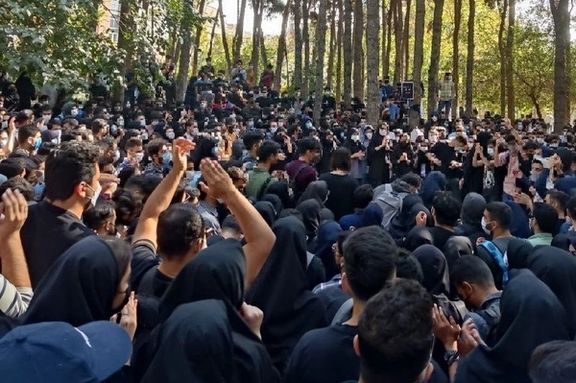
Students at various universities across Iran have announced that they will go on strike and refuse to attend classes until their imprisoned colleagues are freed.

Students at various universities across Iran have announced that they will go on strike and refuse to attend classes until their imprisoned colleagues are freed.
Students at Tehran, Yazd, Beheshti, Allameh Tabatabai and Azad North said the boycott will continue as long as security forces maintain a high presence on campuses.
In recent weeks, anti-riot and vigilante Basij forces have used all their efforts to suppress students at universities, arresting hundreds.
On Saturday, security agents searched the students at North Tehran Azad University and Sharif University when they entered the campus.
Earlier, students at Yazd University also announced that they will boycott lectures starting Saturday in protest to “the illegal and inhumane actions” of university officials.
Videos received by Iran International show students at Tehran University of Research and Sciences chant slogans such as "Woman, Life, Freedom" and "Student dies, but does not accept humiliation" on Saturday.
In another video the head of Tehran University's security, Hossein Izadiyar, tells the students “If you don’t end your sit-in, I will open the door for armed forces to arrest you.” He adds threateningly that “now this issue is the [political] establishment’s redline, get up and go to your classes.”
Reports say students in Mashhad, Sanandaj, Gilan, Kermanshah, and Tehran have gathered to chant slogans. School students in several cities held rallies as well.

The Chairperson of Australian Senate Foreign Affairs Committee has urged the government and prime minister to take tangible actions on Iran regarding the violence against protesters.
Senator Claire Chandler told Iran International's correspondent in an exclusive interview that many countries are demanding action and imposing bans on Iran’s government, but the Australian cabinet has not yet taken any action.
Iran has been the scene of antigovernment protests since mid-September and the clerical regime has killed nearly 280 people.
“All Australians and particularly Australian women have been looking at what's been happening in Iran over the last few weeks particularly following the death of Mahsa Amini and really they are sympathizing with their plight and wanting to see some sort of action from Australia on the international stage,” added Senator Chandler.
She went on to say that many other countries are demanding action against the Iranian government, placing sanctions for the violence perpetrated against women and the broader Iranian population, but the Australian government has not yet taken any action.
“As in my capacity as the shadow Assistant Minister for Foreign Affairs on behalf of the opposition, I've been calling for the government to act against the position that Iran has on the United Nations Commission on the status of women. But again, that call has gone unanswered,” Chandler told Iran International.
In the end, Chandler expressed solidarity with Iranians saying, “Even though Australia is on the other side of the world to Iran, we really sympathize with the plight of Iranian women who are also very brave in protesting.”
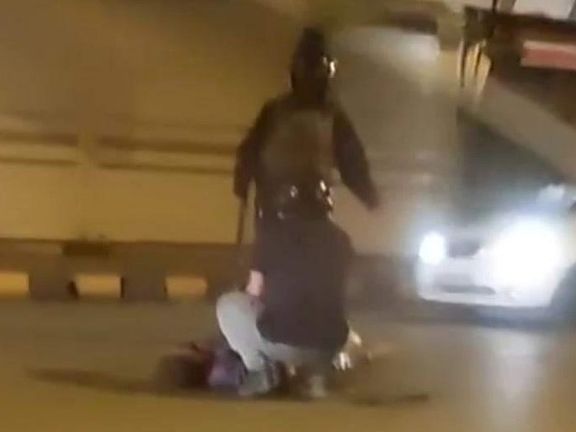
Despite security forces killing multiple people in Iran during the day on Friday, antigovernment protesters surged back to the streets after the nightfall.
Demonstrators in Tehran, Ahvaz, Bushehr, Sanandaj, Kerman, Lahijan and even in some small towns and villages like Nimvar in Markazi province and Podol in southern Hormozgan province held nightly protests.
In the capital, Javadieh, Tehranpars, Ekbatan and other neighborhoods in different corners of Tehran people took to the streets after dark, lighting fires, blocking roads, and chanting anti-government slogans.
Hours after regime forces opened fire on unarmed people in several cities in Sistan and Baluchestan Province, Zahedan’s Sunni Imam, who had earlier in the day called for a referendum during his prayer sermon, once again strongly condemned the Islamic Republic's crackdown on protesters in the city of Khash.
The moment when security forces open fire and shoot three people in Khash
Molavi Abdolhamid said security forces killed at least 16 and injured dozens of others on Friday by opening fire on protesters who were throwing stones at the governor's office.
He slammed the way the government deals with protests in Sistan and Baluchestan saying that it reveals the “depth of cruelty and discrimination.”
Armed government agents also shot at the family of Shirin Alizadeh, one of the victims of the protests in Esfahan, during a memorial on the 40th day of her death, injuring at least three. These forces also insulted Shirin Alizadeh's family and prevented them from continuing the ceremony.
Meanwhile, a shocking video proving the regime’s extreme brutality emerged Friday night that shocked many. The video shows the family of Momen Zand Karimi washing the dead body of their teenage son before laying him to rest in a remote village Thursday night as government officials did not allow them to bury him in his home city of Sanandaj.
Momem Zand Karimi was killed by birdshots fired from shotguns during Wednesday protests when he was on a short leave from his military service.
Scenes of a vigil held for another victim Erfan Zamani in the northern city of Lahijan and also the video of the dead body of a young boy in Khorramdasht near Karaj, who was shot in the head and carried away by a police pickup truck on Thursday, were among other videos going viral.
While using lethal force against demonstrators, the government tried to bring out its supporters on Friday to mark the anniversary of taking American diplomats hostage in 1979.
However, the attempt was a disaster, as the Islamic Republic failed to mobilize its supporters and in some cities people who showed up were a few dozen or a few hundred. The state TV began using old footage to claim a big turnout. For Sanandaj, a hotbed of protests the TV showed a large crowd marching in rain, while the weather was sunny in the city.
The state TV was also forced to air some similar shots for different locations to show the presence of a large crowd.
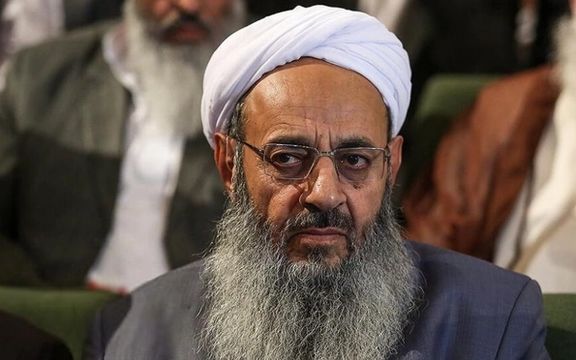
A top Sunni cleric in Iran has called for an internationally monitored referendum, saying by killing and suppression the government cannot push back a nation.
During his Friday sermon, Molavi Abdolhamid, the Friday prayer Imam of Zahedan told regime leaders, “By killing, beating, and arresting, you cannot push back a nation that has been protesting in the streets for 50 days now.”
Addressing the government, he said “Now, the majority of people are unhappy. If you don't agree, hold a referendum with the presence of international observers and accept the result.”
By calling for a free referendum to decide the future form of government, Abdolhamid echoed a long-held demand by critics and opponents of the Islamic Republic. It marks a turning point for the Sunni leader who has long tried to survive in the dangerous environment of a Shiite religious theocracy.
Abdolhamid supported the presidency reformist Mohammad Khatami and moderate Hassan Rouhani in the past.
In 2021, he complained that neither had delivered on their promises of improving the conditions of the Sunni minority and giving them a share in the government and said he would vote for hardliner Ebrahim Raisi but was disappointed once again.
In October 2021, Abdolhamid who was known as a rights defender in the past said he hoped the Taliban “can become muscle for the Islamic Republic” and called on other countries not “to pre-judge the Taliban”, arguing that the group had changed, and its critics were exaggerating their shortcomings. Abdolhamid’s pro-Taliban statements led to criticism among Iranians and even among the Baluch people.
But when security forces killed scores of Sunnis during protests on September 30, Abdolhamid held Supreme Leader Ali Khamenei responsible.
The attack by the IRGC left more than 90 unarmed Baluch citizens dead as reported by human rights watchdogs in Iran and abroad.
Security forces once again opened fire at protesters with live ammunition while a huge crowd of people chanted “Death to Khamenei” and “Death to Dictator” during protests in the southeastern Sistan and Baluchestan following Friday prayers.
The incident followed weeks of brutal crackdown by the IRGC and other Iranian security forces on protesters in the provincial capital Zahedan, who have joined the nationwide antigovernment protests triggered by the death in custody of 22-year-old woman Mahsa Amini.
The government used violence against demonstrators in Zahedan, Saravan, Khash, Rask, and Sarbaz in the province on Friday after prayers.
Baluch activists announced that several people have been shot and killed in Khash and Zahedan by security agents. Reports say many more have also been injured.
Iran’s state-run media outlets say some protesters attacked the office of Khash governor and torched a police car while security forces fired tear gas and shot at angry demonstrators.
Gunmen on top of the Khash governor's building shooting at protesters
Friday coincides with the commemoration ceremonies for some other young people killed in previous protests.
After calling on people to keep up with their demonstrations on Friday, Iranian exiled Prince Reza Pahlavi once again urged them to mark the memory of those killed by the authoritarian regime as well.
He also called on leading democraciesto “further isolate and increase pressure on the regime, while expanding efforts to provide support to the people.”
Videos received by Iran International show people in Esfahan, Shahinshahr, and Karajheld gatherings to pay respect to those murdered forty days ago.
Iran has been gripped by nationwide protests against the rule of Supreme Leader Ali Khamenei for almost seven weeks, but the authorities keep blaming the protests on foreign countries claiming that “some limited numbers of youths are deceived by enemies”.
In its latest, Commander of Iran’s Revolutionary Guard Hossein Salami once again threatened “the Islamic Republic’s enemies” with revenge for their “interventionist and mischievous actions” on Thursday.
Salami had threatened Iranians October 30 not to take to streets anymore, but the people turned out in greater numbers to stage protests this week.
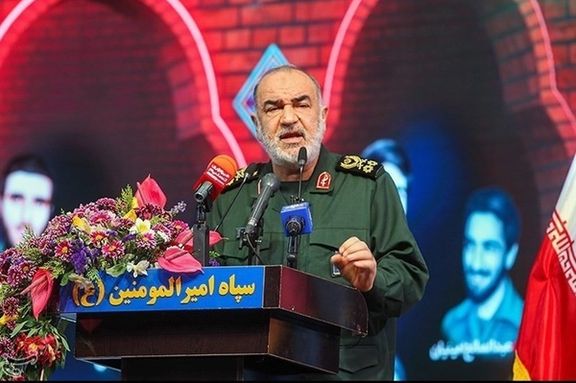
Commander of Iran’s Revolutionary Guard Hossein Salami has threatened “the Islamic Republic’s enemies” with revenge for their “interventionist and mischievous actions.”
On the sidelines of the state-sponsored rallies to commemorate the anniversary of the occupation of the US embassy in Tehran in November 1979 and taking dozens of Americans hostage for 444 days, Salami said, “the enemies know that we will definitely respond to their interventionist and mischievous actions, but now we cannot say where and how we will do that.”
Using the term “Enemies” is a favorite of Supreme Leader Ali Khamenei to refer to the United States, Israel, US allies in the region and in Europe.
“The enemies that said they were not focusing on the revival of the nuclear deal (JCPOA) have now focused on the domestic issues of the Islamic Republic,” the IRGC chief said. “They are worried that the Islamic Republic may take action against them. Accordingly, they have now retreated into a defensive shell for fear of Iran’s action against them,” he added.
Following Supreme Leader Ali Khamenei’s lead, Iranian officials claim that the ongoing antigovernment protests across Iran – ignited by death in custody of 22-year-old Mahsa Amini -- are instigated by foreign enemies, particularly the US, Israel and some European countries.
On the fourth of November 1979, a group of radical students who were followers of Ayatollah Ruhollah Khomeini stormed the US Embassy in Tehran and took 52 US diplomats and citizens hostage, marking the moment as the start of Iran’s hostage diplomacy. Since then, Iran has detained many dual nationals visiting the country and has used them as bargaining chips against Western countries, human rights organizations have said.
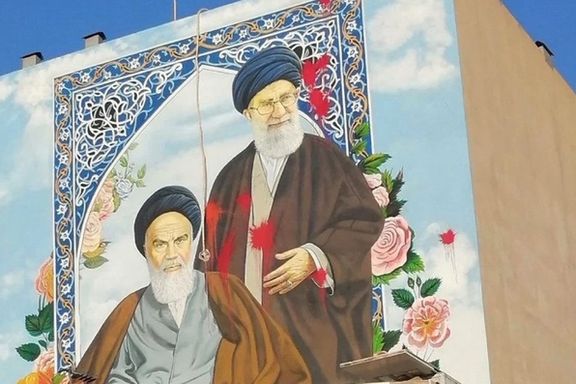
Statements by several Iranian officials lately show that despite often defiant rhetoric, they begin to fear that the Islamic Republic might be nearing its end.
On Thursday, the escalation of unrest in Karaj, Tehran, Amol, Ghazvin, Esfahan and many other Iranian cities took the protests in Iran to a new height and intensity.
Zabihollah Khodaeian, the chairman of State Auditing Organization has said that "Enemies believe the Islamic Republic is finished." Like most other Iranian officials who have signalled their fear that the Islamic Republic's downfall might be near, Khodaeian blamed foreign governments for the uprising although he acknowledged that protests started after a young woman was murdered in mid-September while in police custody.
Although protests continue in tens of Iranian cities every day, Khodaeian claimed that only a handful of people take to the streets to voice their protest against the government. Meanwhile he called on the government to explain the events on social media platforms.
Ultra-conservative Lawmaker Mostafa Mirsalim also admitted that "Some Iranians do not believe in the Guardianship of Supreme Jurisconsult," or the concept of a Supreme Leader, which is the underlying principle of Khamenei's leadership of the Islamic Republic.
Chairman of Iran's Passive Defense Organization Gholamreza Jalali also blamed foreigners for what he called "A five-fold hybrid war" against Iran which he said will soon target the country's oil and energy sector, ANA news agency quoted him as saying. Jalali said that his organization has plans for emergency responses to these threats, as well as thinking of preventive measures.
Blaming the United States, Jalali said the level and scope of these threats are constantly changing. "Oil and energy sector are the first priority for our enemies. Last year's cyber-attack on our fuel distribution website was the first step in the enemy's hybrid war against Iran," Jalali said, adding that his organization is planning a cyber security course for the country's managers in a bid to prevent future cyber-attacks. He added that managers who lack Internet literacy should resign to minimize potential damage.
These attacks, he said, are meant to deal serious blows to the Islamic Republic. He added that cyber-attacks on the petrochemical plants can have far more dangerous implications.
Meanwhile, Gholamreza Soleimani, the commander of Basij militia, has claimed that the ongoing uprising is the outcome "the enemy's" attempt to slow down Iran's successes, however, he did not explain what those successes were. He added that "arrogant powers have always instigated seditions in Iran since a long time ago."
Vice President Amir-Hossein Ghazizadeh Hashemi also opined in interview with Didban Iran website that "The enemy, [a jargon coined by Supreme Leader Ali Khamenei to avoid naming the United States, Israel of Europe] has been working for several hundred years to wipe the Islamic civilization off the world."He said "the enemy's sedition" included bringing the new generation of Iranians into the scene of the struggle against the Islamic Republic.
The only Iranian political figure who did not blame foreigners for the uprising, was senior cleric Ayatollah Abdollah Javadi Amoli, who said in an interview with Shafaq news agency (Shafaqna) that "the inefficiency of some officials has prevented Iran's progress." Meanwhile, in a show of sympathy with the protesters Javadi Amoli said: "Feeding the people is not enough. They also want to live a life marked by dignity." He went further on to say that he respected the protesters "Life, Women, Freedom" slogan.